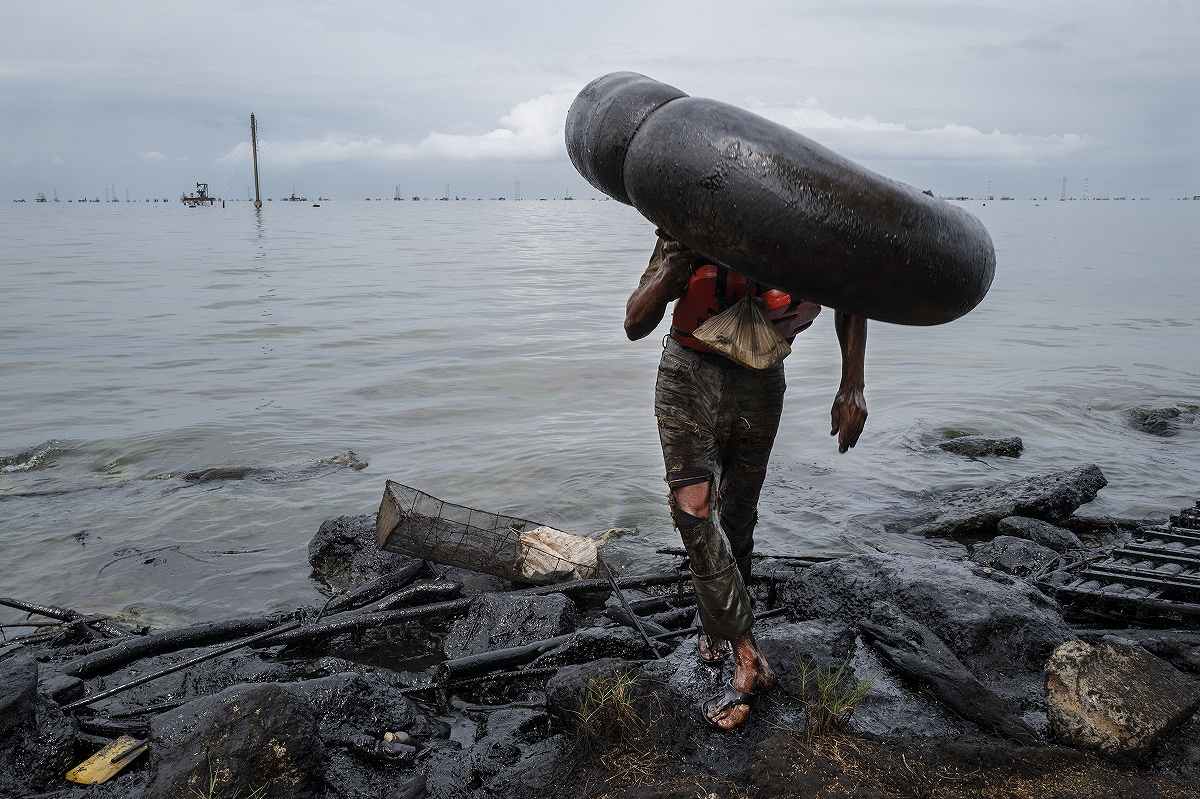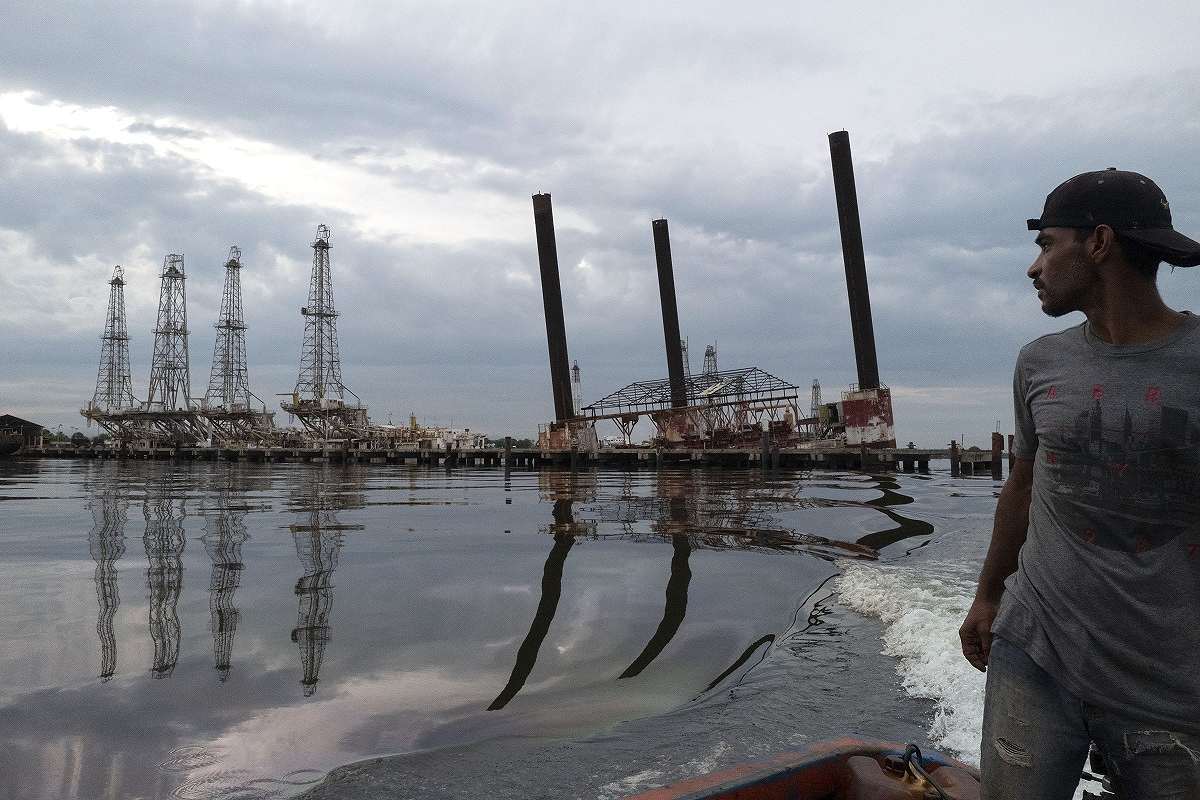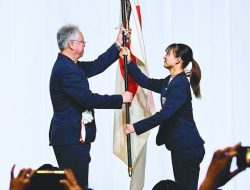
A fisherman, covered in oil and petroleum, exits Lake Maracaibo along the polluted shores of Cabimas, Venezuela. The collapse of the state-run oil company’s infrastructure has destroyed the fish stocks and thoroughly contaminated the region.
15:30 JST, October 21, 2023
For years, Selene Estrach has seen how Venezuela’s crumbling oil industry has taken a toll on Lake Maracaibo, one of the world’s largest and oldest lakes. Once a symbol of the country’s oil wealth, its waters are now coated with iridescent slicks and swirls of neon green algae blooms that can be seen from space.
The pollution is the product of decaying machinery and ruptures in a network of nearly 16,000 miles of underwater pipelines. Though oil slicks are common in Lake Maracaibo, which contains one of one of the planet’s largest known oil and gas reserves, experts and environmental groups have warned that years of mismanagement and a crippled oil industry have left a constant stream of crude oil oozing into the water.
Yet little has been done to clean up the lake, which is home to endangered species such as pink river dolphins and manatees. In recent years, officials have downplayed the pollution as “a visual matter” or “not a big deal.”
That’s why Estrach, a 28-year-old environmental activist, was determined to find a way to help. She founded Proyecto Sirena, a national network of activists dedicated to saving the lake using an unorthodox, yet bountiful, material.
Hair.
She got the idea in July while scouring the internet for easy, cost-effective and sustainable solutions for the pollution marring Lake Maracaibo. She saw that Matter of Trust, a San Francisco-based nonprofit, had used human locks 22 years ago to help soak up a spill off the coast of the Galápagos Islands. Since then, the project had been replicated across the globe.
“It seemed like a crazy idea, but I always like to think that everything’s possible,” Estrach told The Washington Post. “I thought, ‘If they’re doing this in . . . other parts of the world, why can’t we do it in Venezuela?’ It’s easy and cheap. Plus, all the hair that’s left over in the salons is going to waste. Why not put it to good use?”
Since founding Proyecto Sirena – a play on the Spanish words for mermaid and emergency siren, Estrach said her car is constantly filled with bags of donated human and pet hair. Across Venezuela, more volunteers are holding haircut drives that have brought in thousands of people.
In 1989, Philip McCrory, a hairstylist in Alabama, first designed a hair-filled net to be used after oil spills, which NASA later tested and found effective. Researchers from the University of Technology Sydney found in 2018 that hair is “significantly better” at absorbing oil than other materials, including cellulose and cotton.
Hair is mostly made up of a fibrous protein called keratin, which makes it appear to be filled with scales when observed under a microscope. That’s what helps make hair adsorbent – meaning oils stick to its surface.
Hair was not only used in Ecuador in 2001, but to clean the 2007 Cosco Busan oil spill in California, the 2010 Gulf of Mexico oil spill and, most recently, in this year’s spill in the Philippines.
Estrach has spent weeks huddled inside a lab at the University of Zulia, where she is a student, trying to replicate how the Matter of Truth nonprofit used hair after past oil spills. The results are promising, she said, with her tests indicating that about two pounds of hair can soak up between 11 and 17 pounds of oil.
She and her crew plan to stuff hair into mesh nets resembling pantyhose that will be placed in Lake Maracaibo. The nets – or booms – will essentially be floating hair sausages that will surround oil slicks to prevent them from spreading or separating, Estrach said. They’re also using hair to create furry, mat-like devices that can be used to clean up the shore, she said. Estrach and her team will put both hair-filled items to the test in Lake Maracaibo next week.
Estrach’s team is also researching ways to safely discard the oil the devices soak up so they can be reused. “It will be our contribution to a growing field of research about this technique,” she said.
The first step, however, was getting the hair to make the items. Estrach turned to salons for help, initially aiming to get 100 to donate tresses left behind from haircuts. By October, 600 had signed up to help, which will allow her to collect about seven tons of hair every three months.
Michele Giurdanella, 46, the CEO of Salvador Hairdressing, a chain of salons with franchises in Venezuela, Italy and Panama, is one of the hundreds of people heeding Estrach’s call. His 10 salons across Maracaibo each collect approximately seven pounds of hair every day. Last week, Giurdanella ended a 20-year hiatus of not cutting hair to personally help out during a donation drive. Next month, he and about 30 other stylists will give free cuts at Salvador Hairdressing’s headquarters. All the locks from the event will go toward the lake cleanup.
“We’re helping clean up a lake that is so important to our community with something that we’d throw in the trash otherwise,” Giurdanella said. “And, the drive, for example, also helps out with our low-income community members who might otherwise not be able to afford getting a haircut. Everyone wins with this.”
The effort has expanded well beyond Maracaibo. In Caracas, students from the Central University of Venezuela organized another haircut drive this month. They expected 200 people – nearly 1,500 showed up, said Rafael Chavero, a 26-year-old medical student and social activist.
“We had to promise some that we’d do another drive because we just didn’t have enough volunteer stylists to keep up with the demand,” he said.
That day, Chavero said people traveled up to an hour “to literally just give us a baggie of hair they collected.” Others even brought their dogs for a shave and donated the fur.
For Chavero, the widespread support to improve conditions at Lake Maracaibo is “a sign of hope.” Amid a crippling political, economic and humanitarian crisis, environmental concerns had taken a back seat in Venezuela. And though many of those problems persist, Chavero said he has noticed “Venezuelans are now really interested in finding ways to protect our environment and the landmarks that fill us with pride.”
“There’s a brand new thirst for these movements,” Chavero said. “I see a generation of young people who want to take the reins and improve the country we have. At this point, we’re not looking to politicians to help – we’re doing it ourselves.”

A fisherman passes some of the dilapidated infrastructure of the Venezuelan state-run oil company on Lake Maracaibo in Cabimas on May 9, 2019.
Top Articles in News Services
-

Survey Shows False Election Info Perceived as True
-

Hong Kong Ex-Publisher Jimmy Lai’s Sentence Raises International Outcry as China Defends It
-

Japan’s Nikkei Stock Average Touches 58,000 as Yen, Jgbs Rally on Election Fallout (UPDATE 1)
-

Japan’s Nikkei Stock Average Falls as US-Iran Tensions Unsettle Investors (UPDATE 1)
-

Trump Names Former Federal Reserve Governor Warsh as the Next Fed Chair, Replacing Powell
JN ACCESS RANKING
-

Producer Behind Pop Group XG Arrested for Cocaine Possession
-

Japan PM Takaichi’s Cabinet Resigns en Masse
-

Man Infected with Measles Reportedly Dined at Restaurant in Tokyo Station
-

Israeli Ambassador to Japan Speaks about Japan’s Role in the Reconstruction of Gaza
-

Videos Plagiarized, Reposted with False Subtitles Claiming ‘Ryukyu Belongs to China’; Anti-China False Information Also Posted in Japan























